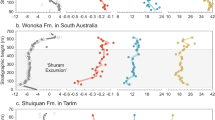Abstract
OXYGEN enriched with respect to 18O has been used to solve the problem of how far oxygen, expired by an animal in the form of carbon dioxide, is identical with that inspired as molecular oxygen. Using rats, and an artificial atmosphere containing oxygen equivalent in isotopic composition to water of 300 p.p.m. excess density, it was found that the expired carbon dioxide, which was dried and collected by refrigeration methods, contained oxygen isotopes in proportions corresponding to water with about 40 p.p.m. excess density, the error of measurement being 2 p.p.m. As the quantity of oxygen absorbed by the animal during each preliminary sweep-out was considerably greater than the total oxygen and carbon dioxide stored as oxy-hæmoglobin or bicarbonate, it can be accepted that the experimental results refer to the steady state.
This is a preview of subscription content, access via your institution
Access options
Subscribe to this journal
Receive 51 print issues and online access
$199.00 per year
only $3.90 per issue
Buy this article
- Purchase on SpringerLink
- Instant access to the full article PDF.
USD 39.95
Prices may be subject to local taxes which are calculated during checkout
Similar content being viewed by others
Author information
Authors and Affiliations
Rights and permissions
About this article
Cite this article
DAY, J., SHEEL, P. Oxygen Isotopic Exchange in Animal Respiration. Nature 142, 917 (1938). https://doi.org/10.1038/142917a0
Issue date:
DOI: https://doi.org/10.1038/142917a0



